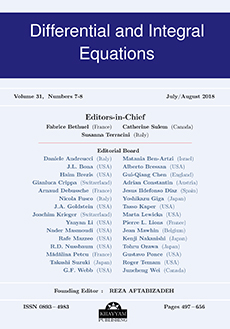Abstract
In this paper we study the problem $-\Delta u = u^{p} + \lambda u^{q}, u > 0$ in $B(1), u = 0$ on $\partial B (1)$ and $\lambda > 0.$ We show that in the case $1 < p \leq {(n+2)/(n-2)}$ there are at most two solutions if $q = 0$, while there are exactly two solutions if $\lambda$ is sufficiently small and $0 < q < 1.$ In the supercritical case $\bigl( p > {(n+2)/(n-2)}\bigr)$ we show the nonexistence of solutions for $1 \leq q < {(n+2)/(n-2)}$ and $\lambda$ sufficiently small. We also consider the problem $- \Delta u = \lambda [ (1 + \alpha u)^{p} + \mu (1 +\alpha u)], u > 0$ in $B(1), u = 0$ on $\partial B(1), \lambda > 0, \alpha > 0$ and $\mu \geq 0.$ We show that for $1 < p \leq {(n+2)/(n-2)}$, there are at most two solutions and, actually, exactly two for $\lambda$ small.
Citation
Adimurthi. Filomena Pacella. S. L. Yadava. "On the number of positive solutions of some semilinear Dirichlet problems in a ball." Differential Integral Equations 10 (6) 1157 - 1170, 1997. https://doi.org/10.57262/die/1367438226
Information





